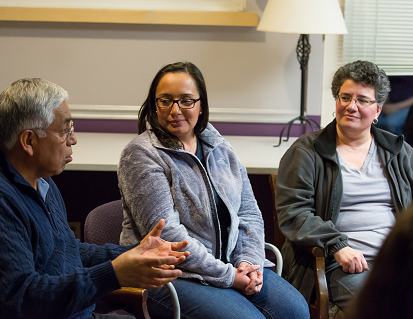Check out our calendar for our most up to date schedule of upcoming events and support groups.
The pain of losing a spouse, a parent, a child or other family member or friend can be profound. It can help to talk or share cup of tea in a warm, supportive, and confidential environment with others who have experienced losses. Our groups are open to all individuals 18 and over.
In case of inclement weather, please check our calendar and the listing for a particular event for announcements of cancellations. We will also post cancellations on our Facebook page.

For more information, contact Laura Ward by email or call 607-272-0212.
We offer the following groups:
We host a variety of support groups throughout the year, both in Ithaca and in Cortland. Some are ongoing, some are time-limited, and some are specific to a particular relational loss (such as the loss of a spouse/partner or bereaved parents).
Structured Support Groups
Led by a trained counselor, groups learn to understand the grieving process and explore experiences through writing and discussion. Offered in four- or six-session formats.
Ongoing Support Groups
We have several groups that meet on a regular basis. A one time registration is required for these ongoing groups and prompt arrival is appreciated. You can stop in when you feel you need to. Offered the first and third Wednesday of the month.
Bereaved Parents Support Groups
Losing a child of any age is the most devastating experience. The Compassionate Friends meet at Hospicare and offer a monthly ongoing support group for bereaved parents and grandparents.
Special Groups
At various times we offer time limited groups, usually with a particular focus. For instance in November and December we may offer a 3 or 4 week group about grief during the holiday season. These groups will be announced in our e-newsletter and included in our calendar. Pre-registration for these groups is required.
Why join a group?
Participating in these programs provides you with the opportunity to share thoughts, feelings, and experiences with others in similar situations and can enhance the healing process and reduce a sense of isolation.
Healing
Research shows that talking to others about a loss or trauma – rather than staying silent – is associated with better health, including a stronger immune system.
Hope
When you spend time in a group, you witness that others have survived a loss and figured out how to cope. That can help you feel hopeful that you, too, will be OK.
Structure
Daily, weekly or monthly activities can add structure to life at a time when a loss may have erased previous routines.
Practical information. Besides the considerable emotional toll, life after a loss can be hard because of new tasks or challenges. Other group members often have practical advice.
Friends
Groups often lead to lasting friendships. Bonds form when you find people who understand what it’s like to have a loss and who aren’t afraid to talk about the subject.
Read a personal account by Edie Reagan, Hospicare spiritual care coordinator, on how a support group helped her after the death of her mother.
“Hospicare has changed everything for me and my family, and this community. With out its services, I would be lost still, 8 years after my mom’s death, in the sea of grief and pain. But the bereavement counseling, workshops, and support groups have illuminated the way in a remarkable sense. That no matter the circumstance of death, there is a bravery in grieving openly. Thank you you for humanizing this process.”
~ Susan